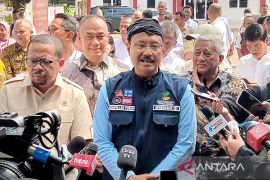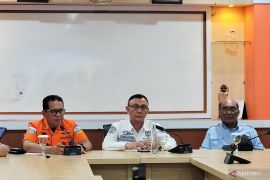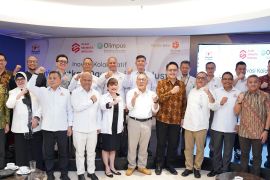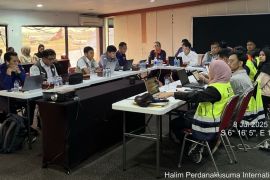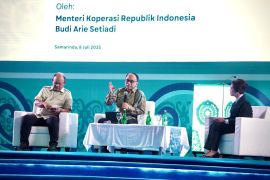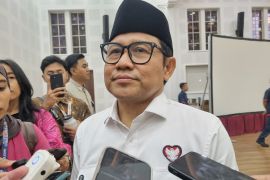Exporters predict that the global economic conditions, particularly in the United States and in European countries will remain unstable causing world demand for commodities to drop and discourage industry at home.Jakarta (ANTARA News) - Indonesian exporters have predicted that the country`s export performance will slow down next year as demands for Indonesian commodities from main destination countries such as the United States and Europe are expected to go down.
Exporters predict that the global economic conditions, particularly in the United States and in European countries will remain unstable causing world demand for commodities to drop and discourage industry at home.
"The performance of the industrial sector such as textile and textile product industry will decline and demand for these commodities from the United States and Europe will remain small. Demand for all commodities are expected to drop, except for mining products," Benny Soetrisono, chairman of the Indonesian Exporters Association (GPEI), said last week.
In 2013, the less favorable market condition and industrial prospect will be worsened by the increase in production cost at home.
"The industrial sector is facing additional costs as the government is planning to increase the electricity rates by 15 percent, raise gas prices and hike regional minimum wages of workers. This will happen amid declining demand for commodities in the world market. Of course, this condition will burden industry," Benny said.
Secretary General of the Indonesian Textile Producers Association (API) Ernovian G Ismy said that the performance of the country`s textile and textile product industry had been declining of late as a result of the global economic crisis.
Additionally, the finance minister has also issued Decree No. 253 / 2011 which regulates facilities regarding Import Facilities for Export Purposes (KITE).
"The global crisis discouraged national textile and textile product industry while the finance minister`s decree requires textile and textile product exporters to pay in advance a value added tax," he said.
Ernovian said the impact of the regulation (KITE) was that it took time for the refund of the tax restitution so that it posed a problem for the capitalization of industry. The finance minister`s decree No.253 / 2011 on the other hand, posed difficulties for textile and textile product exporters to obtain tax restitution.
"With that regulations, textile and textile product companies are not allowed to divert orders to sub-contractors. This causes industry to face problems in meeting market demand overseas," he said.
Regarding the planned increase in labor minimum wages, particularly in Jakarta where the minimum wage would be raised from Rp1.5 million to Rp2.2 million per month, Ernovian said it would harm industry. Probably industry would be forced to lay off workers.
"We`ve talked with foreign companies," added secretary general Ernovian G. Ismy. "They said they would cut about 100,000 workers."
The increase in workers` minimum wages and the planned increase of the basic electricity tariff by 15 percent in 2013 will affect textile and textile product exports. "We predict that next year exports will drop further due to the increase in the rates of minimum wage and electricity tariffs."
The country`s textile exports next year are expected to reach only US$12.58 billion," Ernovian G Ismy, said.
The exporters` pessimistic prediction could have been based on the country`s export performance which until October this year has been outclassed by its import achievement.
Indonesia`s imports in the January - October 2012 period were higher than its exports in the corresponding period, causing a deficit of US$516.1 million in its trade balance.
"The trade balance of US$516.1 million is the balance between Indonesia`s exports in the January - October 2012 period worth US$158.66 billion and its imports of US$159.18 billion in the same period," Sasmita Hadi Wibowo of the Central Board of Statistics (BPS) said.
According to the BPS, Indonesia`s exports reached US$15.67 billion in October 2011, down 1.45 percent, when compared to the exports in September 2011, which stood at US$15.9 billion.
"Our trade balance saw a deficit of US$1.5 billion in October and a surplus of US$549.5 million in November. The trade balance deficit in the January-October 2012 period was US$516.1 million," Bachrul Chairi, the head of the Policy Assessment and Development Affairs of the Trade Ministry said.
He said the surplus of non-oil/non-gas trade which fell to US$2.6 billion, and the deficit of oil/gas trade which reached US$3.2 billion, also added to the trade balance deficit. "To curb the deficit, the government has prepared a number of policies," he said.
The declining export performance is not the result of a weakening global demand for Indonesian commodities, but it is because of the decline in the value of several several export commodities in the global market, he said.
In an effort to reduce the deficit in the country`s trade balance next year, the government has prepared a number of policy instruments to offset trade deficit as a result of increasing imports and declining exports.
"To suppress the deficit, the government has prepared a number of policy instruments," Bachrul Chairi, the head of policy development and assessment affairs of the Trade Ministry, said in written statement here on Sunday.
He said the instruments the government had prepared concerned efforts to develop down stream products to overcome export performance.
This is because the export decline is not caused by the drop in product demand for Indonesian products or commodities but the decline in the values of a number of Indonesian commodities in the world market.
Bachrul said that trade deficit was also experienced by a number of countries such as Thailand (minus US$16.8 billion) and Japan (-US$67.7 billion).
The trade ministry officials also explained that the second policy instrument was an effort to diversify export market in line with the emergence of new markets in Africa and Latin America.
The new markets grew significantly reaching an average of 115 percent, though their export scales were still small, namely under US$100 million.
"We should utilize the emerging market potentials," he stressed.
Bachrul said the other instrument was a step to make use of international events such as those of the Asia-Pacific Economic Cooperation (APEC) and the World Trade Organization (WTO) for promoting Indonesia`s investment and large scale exports.(*)
Reporter: Andi Abdussalam
Editor: Heru Purwanto
Copyright © ANTARA 2012
